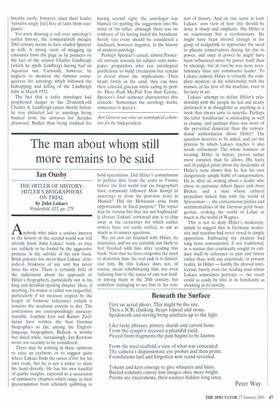The man about whom still more remains to be said
Ian Ousby
THE HITLER OF HISTORY: HITLER'S BIOGRAPHERS ON TRIAL by John Lukacs Weidenfeld .E25, pp. 279 Anybody who takes a serious interest in the history of the second world war will already know John Lukacs' work, so they are unlikely to be fooled by the aggressive promise in the subtitle of his new book. Brisk polemic has never been Lukacs' style; indeed, briskness of any sort has never been his style. There is certainly little of the indictment about his approach to Hitler's biographers, particularly not in his long and detailed opening chapter. Here, if anything, his stance is rather too respectful, particularly if we measure respect by the length of footnote references (which it remains the academic custom to do). The conclusions are correspondingly unexceptionable. Joachim Fest and Rainer Zitelmann have written the best German biographies so far; among the Englishlanguage biographers, Bullock is worthy but dated while. tantalisingly, Ian Kershaw wrote too recently to be considered.
There may be nothing in these opinions to raise an eyebrow, or to suggest quite where Lukacs finds the raison d'être for his own study, but he is not a writer to show his hand directly. He has his own handful of quirky insights, explored in a succession of ruminative chapters which range in their preoccupation from scholarly quibbling to bold speculation. Did Hitler's commitment to politics date from the years in Vienna before the first world war (as biographers have commonly followed Mein Kampf in asserting) or from the post-war years in Munich? Did the Holocaust arise from opportunism or fixed purpose? The topics may be various but they are not haphazardly chosen. Lukacs' continual aim is to chip away at the certainties for which earlier writers have too easily settled, to ask as much as to answer questions.
We are not yet finished with Hitler, he maintains, and we are certainly not likely to feel finished with him after reading this book. Now that we have outgrown the need to demonise him, the real task is to historicise him. By this Lukacs does not, of course, mean rehabilitating him, nor even reducing him to the status of one war leader among many in the 20th century, but somehow managing to see him in the con
text of history. And on one score at least Lukacs' own view of how this should be done is sharp and emphatic. His Hitler is no reactionary but a revolutionary. He might have been shrewd enough in his grasp of realpolitik to appreciate the need to placate conservatives during his rise to power, and once in power he might have been influenced more by power itself than by ideology, but at root he was more revolutionary than any communist leader. To Lukacs, indeed, Hitler is virtually the complete modern: in his relationship with the masses, in his love of the machine, even in his taste in art.
Lukacs' attempt to define Hitler's relationship with the people he led and nearly destroyed is as thoughtful as anything in a book that always aims to unsettle. Perhaps the label 'totalitarian' is misleading as well as clumsy, and perhaps there was more of the perverted democrat than the conventional authoritarian about Hitler? The question deserves to be asked, and yet the process by which Lukacs reaches it also needs refinement. The whole business of locating Hitler in history proves rather more complex than he allows. His hasty and ill-judged point about the modernity of Hitler's taste shows that he has his own dangerously simple habit of categorisation. He is, after all, writing about a leader who chose to patronise Albert Speer and Arno Breker, and a man whose cultural prejudices linked him with the world of Spiessertum — the conventional pieties and sentimentalities of the German petty bourgeoisie, evoking the world of Lehar as much as the world of Wagner.
This is not to deny Hitler's modernity, simply to suggest that in Germany modernity and reaction had never stood in simple opposition. Embracing the modern had long been conventional, if not traditional, in a nation that continually sought to validate itself by reference to past and future rather than, with any exactitude, to present reality. In Hitler — hardly the shrewd intellectual, barely even the reading man whom Lukacs sometimes portrays — the result could as easily be trite in its familiarity as shocking in its novelty.






















































































 Previous page
Previous page